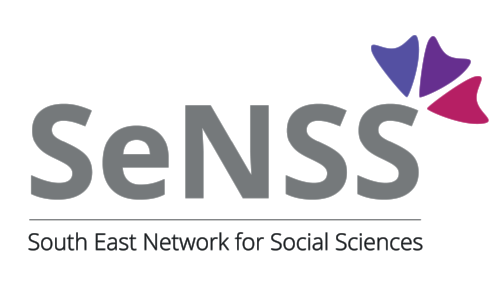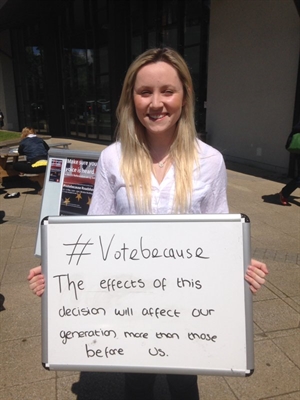On 15th October Dublin City University will host an event, Media and Politics in a Polarized World. The notion that news media are causing increased political polarization has taken hold in recent years but evidence is mixed and policy responses in different countries have varied enormously. Are publics more polarized or are we just more aware of extreme views because they are visible on social media? NewPolCom’s Ben O’Loughlin is one of several academic speakers who will address this topic, including the LSE’s Lilie Chouliaraki and Leeds’ Chris Anderson. The event will also feature talks from Sarah Hartley of Google News Lab and Aine Kerr from Neva Labs. The event is organised by Tanya Lokot.
New project funded on youth opinion in Baltic States and Ukraine
Ben O'Loughlin and his colleagues Natalia Chaban and Alister Miskimmon have won a new grant from Jean Monnet for a project to begin later in 2018, Youth Opinion and Opportunities for EU Public Diplomacy: Youth Narratives and Perceptions of the EU and EU-Ukraine Relations in Ukraine and the three Baltic States (E-YOUTH).
The project teams up with universities in Lithuania, Latvia, Estonia and Ukraine to conduct a comprehensive analysis of youth opinion (students of higher educational establishments and high schools) in Ukraine and the three Baltic states. The focus is to identify the narratives through which young people views the issues of Ukraine’s relations with the EU, its European orientation and aspirations, and the background of the ongoing violent conflict with Russia. The activity will also specifically focus on the youth views on Ukraine’s relations with the three Baltic states who are EU members. The project will use a mix of surveys and focus groups to identify narratives and perceptions.
O'Loughlin, Chaban and Miskimmon are currently completing a previous Jean Monnet project exploring views of the EU in Israel, Palestine and Ukraine, reporting to the EU in September. The new project zooms into an area of Europe causing greater concern for NATO, the EU and, most importantly, people living in those countries. This line of research helps us understand how ordinary people - particularly young people - experience being in the centre of geopolitical uncertainty and the stories they tell to make sense of their country and their own situation.
ESRC Postdoctoral Fellowship for Matthew Hall
Congratulations are due to Matthew Hall, who has won an ESRC SeNSS Postdoctoral Fellowship for his project, Citizens 3.0 - Who should control the powerful technologies that govern our lives?
Matthew completed his ESRC-funded PhD with us in July 2017, supervised by Jonathan Seglow and Ben O'Loughlin, with a thesis entitled Liberal Democratic Surveillance: Rules, Legitimacy, and the Institutionalisation of Domination. With his Postdoctoral Fellowship, Matthew will have space to publish from his thesis, develop new lines of argument, and engage activists and journalists with his diagnoses of technology and power.
Media, War & Conflict 10th Anniversary Conference, Florence, 22-23 May 2018
(L-R) Keynote Andrew Hoskins with editors Ben O'Loughlin, Sarah Maltby, Laura Roselle and Katy Parry.
The 10th Anniversary Conference of the Media, War & Conflict journal took place in Florence on 22-23 May 2018, generously hosted at Accademia Europea di Firenze. The conference featured a keynote plenary on Women, Conflict and Journalism featuring Barbara Barnett, Linda Steiner, Daniella Peled and Dina Matar, a keynote by Andrew Hoskins, and a screening by Piotr Cieplak of his film The Faces We Lost.
The event was a great success, not least due to the wonderful setting -- and cuisine -- provided by Accademia Europea di Firenze. The papers presented represented a diverse, multi-disciplinary and growing field of research and many new friendships and collaborations were formed.
The full conference programme can be downloaded here. Curated tweets from the event can be found here. The conference was sponsored by the Sage publishers, Elon University, and the New Political Communication Unit. Special thanks to Laura Roselle and Elon University for making the conference happen.
Calm before the storm. The glamorous editorial team make name badges before the delegates arrive.
PhD for Adam Drew for Cyber-security research
NewPolCom doctoral student Adam Drew was awarded his PhD on 15 May 2018 after defending this thesis, Cyber-Security: An Analysis of International and Domestic Norm Emergence. His external examiner was Prof. Maura Conway of Dublin City University and his internal examiner was Dr. Tom Dyson of Royal Holloway. Adam was supervised by Prof. Ben O'Loughlin.
Congratulations to Dr. Drew!
New article on tabloids and misinformation by Chadwick, Vaccari & O'Loughlin in New Media & Society
News in the United Kingdom.
The tripartite author team of Andy Chadwick, Ben O'Loughlin and Christian Vaccari have published their third recent study examining social media and political behaviour. The article, Do Tabloids Poison the Well of Social Media: Explaining Democratically Dysfunctional News Sharing, is published in New Media & Society. In it, they find that tabloid news is more strongly connected with democratically dysfunctional behaviours, and that many people freely admit to sharing news they know is inaccurate or false. The paper offers unique insights into the reactions of social media users when called out on sharing misinformation - some appear ashamed, others are amused. Does this mean there are more long-term maladies in British democracy that go beyond Cambridge Analytica and Russian trolling? Read here.
Abstract:
The use of social media for sharing political information and the status of news as an essential raw material for good citizenship are both generating increasing public concern. We add to the debates about misinformation, disinformation, and “fake news” using a new theoretical framework and a unique research design integrating survey data and analysis of observed news sharing behaviors on social media. Using a media-as-resources perspective, we theorize that there are elective affinities between tabloid news and misinformation and disinformation behaviors on social media. Integrating four data sets we constructed during the 2017 UK election campaign—individual-level data on news sharing (N = 1,525,748 tweets), website data (N = 17,989 web domains), news article data (N = 641 articles), and data from a custom survey of Twitter users (N= 1313 respondents)—we find that sharing tabloid news on social media is a significant predictor of democratically dysfunctional misinformation and disinformation behaviors. We explain the consequences of this finding for the civic culture of social media and the direction of future scholarship on fake news.
Sloam study of #votebecause published in New Media & Society
Royal Holloway students were at the forefront of #votebecause activity.
James Sloam has published a new article in New Media & Society entitled, #Votebecause: Youth mobilisation for the referendum on British membership of the European Union. James presents his ethnographic study of student voter mobilisation through new political communication, notably the #votebecause hashtag. Congratulations to James! Read the study here.
Abstract
For several decades, academics and political commentators have lamented the decline in electoral participation among younger citizens. In the United Kingdom, the proportion of 18- to 24-year-olds voting in general elections fell from over 60% in 1992 to an average of 40% between 2001 and 2015. Nevertheless, the high youth turnout in 2017 showed that young people will vote if they are interested in an issue or cause. Despite the scholarly interest in youth turnout, few studies have investigated the individual motivations for electoral participation among young people. This article aims to fill this gap. It presents a qualitative analysis of ‘#Votebecause’, an offline–online initiative to encourage students to vote in the 2016 referendum on British membership of the European Union. The findings identify the importance of social networks, appropriate spaces for communication, deliberation, prior group membership and internal efficacy for engaging young people in the campaign.
Amber MacIntyre - watch her video presentation at ECF Campaigning
Amber MacIntrye presented brief findings of her ongoing PhD research at the annual ECF Campaigning Forum in Oxford on 10-11 April 2018. Amber is currently conducting fieldwork in Berlin as she examines how advocacy and campaigning groups use data. Find Amber on Twitter @Sliktor
NPC Wired Episode 5: Viral Memes as a Tool of Political Protest in Russia
This week's episode, hosted by Sofia Collignon Delmar and Nikki Soo, features Anastasia Denisova. Discussing the use of viral memes as a form of political protest and resistance, she explains how this is particularly important with censorship in Russia. She also shares more on her data collection methods, challenges she faced along the way, and her favourite meme.
Dr Anastasia Denisova is Lecturer of Journalism at the University of Westminster. Before embarking on academia, she spent a decade as a journalist in Russia. She is currently writing her book Internet Memes and Society based on her research on Internet memes as the casual artful means of political resistance in the restricted Russian media environment. It will be available in 2019. Read more about her research here, and follow her on Twitter here.
NPCU event on EU diplomacy and narratives, Chatham House, 17 April 2018
Chatham House will host a private discussion of findings from the C3EU project - Crisis, Conflict and Critical Diplomacy of the EU - on 17 April 2018. Ben O'Loughlin and colleagues Natalia Chaban and Patrick Müller will present analysis on productive ways for the EU to communicate with and engage audiences in Ukraine and Israel-Palestine.
Crisis, Conflict and Critical Diplomacy: Narratives and Perceptions of the EU in Ukraine, Israel and Palestine
Tuesday, 17 April | 14.00 - 15.30
Speakers:
Natalia Chaban, Professor of European Union Studies, University of Canterbury, New Zealand
Ben O'Loughlin, Professor of International Relations, Royal Holloway University of London
Patrick Müller, Ikerbasque Research Fellow, University of the Basque Country, Spain
Chair:
Yossi Mekelberg, Associate Fellow, Middle East and North Africa Programme, Chatham House
Location:
Chatham House | 10 St James's Square | London | SW1Y 4LE
This roundtable will explore findings from a Jean Monnet-funded 3-year study of strategic narratives and perceptions of the EU in two conflict spaces, Ukraine and Israel-Palestine. By identifying how different local actors (elites, media and youth) narrate the international system and the role of their nation in it, is it possible to explain how and why they offer specific narratives about future prospects for peace and the EU’s role as potential mediator?
The roundtable will be held under the Chatham House Rule.







